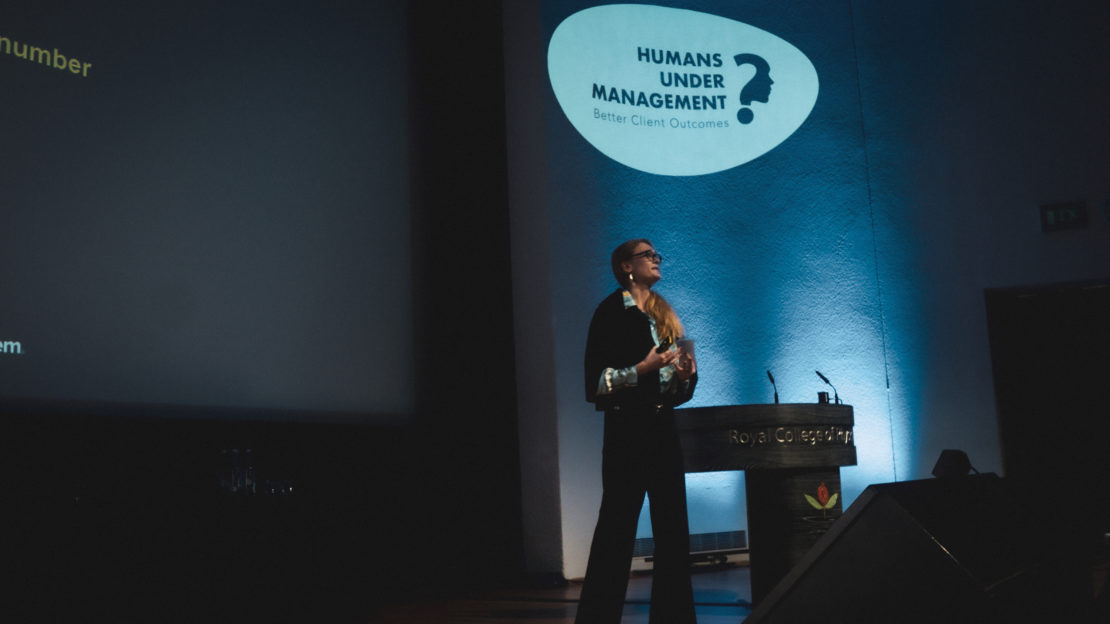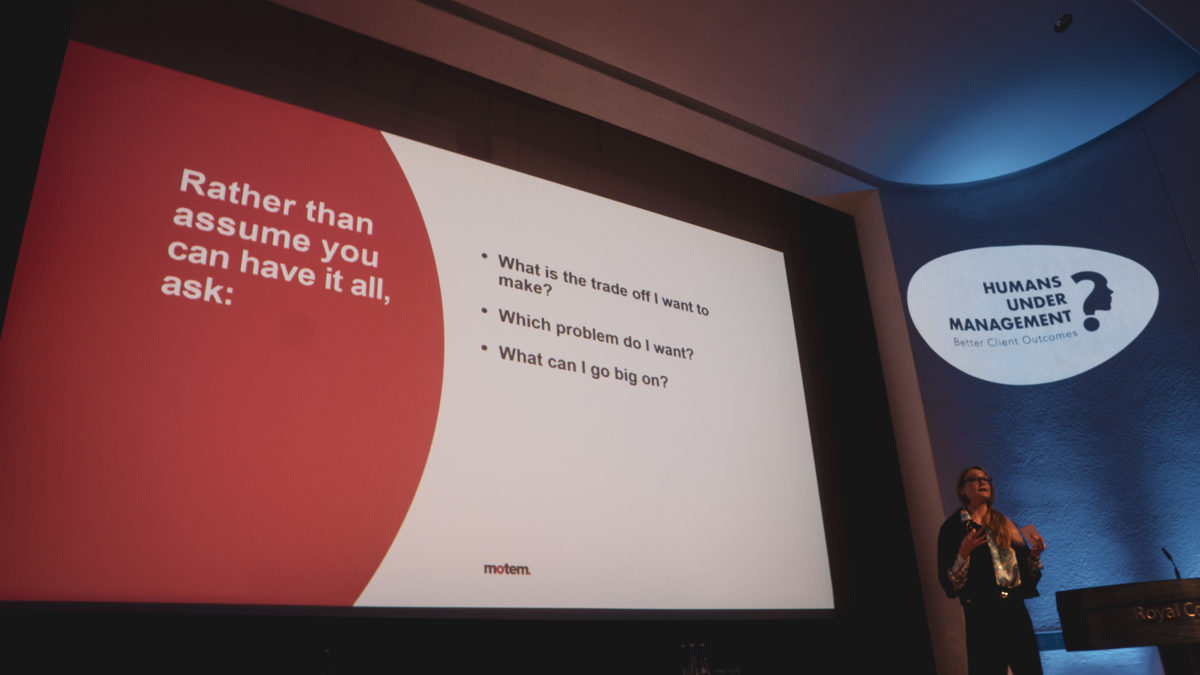Have you ever felt overwhelmed, undervalued or too thinly spread?
Do you ever get that sense of dread if you see a client’s name flash up on your phone as they’re trying to reach you urgently – even though they may have been ignoring your emails for weeks?
Have you ever noticed yourself feeling resentful because you’re spending your time, attention and energy on something – that you don’t really value?
Truth is that we all have probably been in those situations but many of us carry on, suck it up, grin and bear it without questioning or challenging whether this has to be the case. We are so busy, have so many demands on our time, so many deadlines that it’s a struggle to put our hand up and say enough.
Let alone imagine how it could be different.
We’re in a culture which prides itself on bigger, better, faster more…and with that we are losing the opportunities to stop, think and reflect on whether these things, these trophies of success, the hallmarks of the velvet gutter*, are actually what we want.
I want to argue that…
A disciplined pursuit of less delivers more fulfilment and higher quality work.
Why am interested in this now?
I specialise in helping those in the finance sector to communicate more effectively. That involves training and coaching and prior to lockdown meant I was running around the country delivering all kinds of workshops. Then in lockdown I spent time developing some online communication programmes aimed at advisers and paraplanners. The idea was that I could scale this and help more people without exhausting myself. But then when lockdown lifted – suddenly there were conference tours, leadership programmes, a whole host of work came flooding in – and I merrily said yes to it all.
And this was for a number of reasons:
Firstly, I am a recovering people pleaser, like to help people if I can. I think many advisers and planners are like this too – it’s a noble profession. It attracts people who want to help others. This means saying no has been really hard for me.
Secondly, I like doing a lot of things. I like variety, I’m curious, I like creating stuff. If I don’t know how to do something, I like the process of finding out. This is fine up to a point. However it’s tiring when you’re learning and figuring out all the time. It also means that you end up having less time to do the work you’re actually good at – so your contribution and joy actually falls. And as a people pleaser, disappointing others is a big deal.
Linked with that means that things take longer – so evenings and weekends get taken up. Interestingly there’s now research published in the British Medical Journal showing that sleep deprivation has a similar effect on our brain as alcohol. (Although much less fun). We are less effective, much sharp.
Chuck into the mix covid – where you’re supposed to be resting – but as you’re living at the office (rather than working from home) the work doesn’t stop. That “can do attitude” that we all love so much, that is prized so highly on teams and by clients comes at a cost.
It’s my own poisoned chalice from which I’ve been merrily swigging for years.
Burnout Beckoned
Earlier in the year I reached a point where I was totally burnt out. The joy in my work had seeped away, I was constantly tired and just couldn’t find any mojo. It was at this time that I listened to a podcast (Tim Ferris interviewing Greg McKeown). And came across the idea of an essentialist.
Which in a nutshell is about making the wisest possible investment of your time and energy in order to operate at your highest point of contribution by doing only what is essential.
It seemed I was the non-essentialist poster girl.
And so this year I’ve been going through quite a shift – and I want to share some of the tough questions and thought processes I’ve gone down because I too notice is that many planning and advice firms are suffering from what Morgan Ranstrom calls “The Triple Whammy”.
“The Triple Whammy will sink you. The Triple Whammy will leave you exhausted and exasperated. It will make you question your career choice. It will make you regret your decision to become an entrepreneur. It can strain your marriage and your family life. And it may also lead you to prematurely sell your firm to untangle yourself from the mess.”
Morgan Ranstrom
Too much work, for too many clients, for too little money.
Perhaps you recognise this in your own firm?
Its leads to:
- Overstaffing
- Low Margins
- Burnout
- Inefficiencies
- Frustration
- Resentment
- Challenging Client Relationships
How did we get here?
It rests on a number of beliefs and mindsets…
1. A culture underpinned by “The undisciplined pursuit of more”
More scale, more growth, more acclaim, more of whatever those in power see as “success.” This is a concept Jim Collins developed in the book How the Mighty Fall – where he talks about Five Stages of Decline.
Companies stray from the disciplined creativity that led them to greatness in the first place, making undisciplined leaps into areas where they cannot be great or growing faster than they can achieve with excellence, or both. When an organization grows beyond its ability to fill its key seats with the right people, it has set itself up for a fall. Although complacency and resistance to change remain dangers to any successful enterprise, overreaching better captures how the mighty fall.
Jim Collins
2. The idea that you can have it all
Then we get into a situation where we are over committed, overloaded or overworked.
It’s interesting to note that the word Priority in the English language during the 1400’s and meant ‘singular’, or the ‘prior thing’. It stayed singular for the next 500 years. Only in the 1900s did we pluralise and start talking about PRIOIRITIES.
Busy becomes a status symbol:
“How are you?”
“Busy” (Subtext: I’m very important )
But too often, I’ve been a busy fool. And as Socrates says: “Beware of the barreness of a busy life”.
What we’re denying is the reality of trade offs.
A trade off involves two things we want. Do you want more pay or more holiday time? Do you want to finish this next email or be on time for your meeting? Do you want it done faster or better. We want both but we simply cannot have it all. We need to choose carefully and then go big on the thing we choose so that we can really excel and have the most impact
3. Carving out space to think rigorously is a struggle
When we’re overcommitted overextended – we passively go along with over people’s agenda. Especially those who shout the loudest. So busy we don’t have time to question. We crave small quick wins, we just want if off our plate. That feels like the achievement.
Essentially we get “tricked by the trivial” – we end up where we don’t want to end up.. And we run the risk of getting to the end of our lives and looking back regretting some of the choices we made. As Dan Pink says in his new book, “Future you has a very good idea of what you’ll regret”.
BUT..
If you are willing to make some hard decisions, here’s what is waiting for you on the other side.
- Ideal Clients
- A healthy work life blend
- Ample Time for holidays
- Profitable firm
- Happy and well-paid staff/contractors
- An efficient and respected practice
These sound pretty good, right?
How do we get there?
A. Focus on what really matters.
We need to create some space to think so that we can focus on what’s important. Who are your ideal clients, who are the people you love to work with and support? What is the work you want to be doing – what is your idea of success? How much meaning and purpose would you like your work to give you? How do you want to be spending your time?
To do this, it’s helpful to have offsite meetings where there are no distractions and you focus on the big picture and what really matters. These are big meaty topics that you can’t just dip into or snack on in a snatched lunch break. They require a different mode of thinking and it can be helpful to have them facilitated so you can just focus on the big picture, you can really focus on the contribution you want to make and the impact you want to have.
When you have that clarity about how you want to spending “your one precious life” as the poet Mary Oliver says, it becomes much easier to say no because the trade off is much more apparent.
B. Pursue less but better
“”Only once you give yourself permission to stop, trying to do it all, to stop saying yes to everyone, can you make your highest contribution towards the things that really matter.”
Greg McKeown
This is the essence of essentialism.
Rather than assume you can have it all, ask yourself:
What is the trade off I want to make?
Which problem do I want?
What can I go big on?
A non essentialist approaches nearly every trade off by asking how can I do both?
Essentialists ask the tougher but ultimately more liberating question – which problem do I want?
The trade off for me – was initially earning less money but having more control over time and more meaning in my work.
The problem I was more willing to address was some insecurity rather than stress and being overstretched and always feeling like I was on the backfoot.
What can I go big on? This is still a work in progress but it’s freeing up more time to think write and teach on the subjects that I feel fascinated by.
Watch this space.
This was part of a talk I gave at Humans Under Management on November 10th 2022 in London.
*the velvet gutter was a term Ruth Sturkey used in her talk to donate a lifestyle where there are big houses (but big mortgages), plenty of cars, kids in private school etc. But not much time or opportunity to lighten the load or responsibility.


